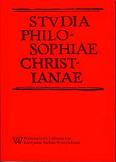Mistyka miłości Bożej w pismach św. Bernarda z Clairvaux
Mysticism of God’s Love in Bernard of Clairvaux’s writings
Author(s): Artur AndrzejukSubject(s): Philosophy
Published by: Wydawnictwo Naukowe Uniwersytetu Kardynała Stefana Wyszyńskiego w Warszawie
Keywords: God; love; mysticism; levels of love
Summary/Abstract: Bernard of Clairvaux’s account of mystical love was already famous in the 12th century and it gained many followers, among whom Bernard’s first biographer, William of Saint-Thierry, should be given first mention. The doctrine had also its opponents, for example in Peter Abelard, who argued that it presented a concept of egoistic love; he himself tried to put forward his own view of charitable and selfless love. In Bernard’s writings, the influences of Greek Platonism from the works of Pseudo-Dionysius and Saint Augustine’s version of western Platonism are joined in a coherent unity. The distinct novum is Bernard’s stress on freedom. He clearly states that love arises from freedom; freedom is a condition of the beginning of love, and it relies on the rejection of enslaving fear and overpowering lust. What is more, this freedom of will (liberum arbitrum) constitutes the dignity of man. “Dignitatem in homine liberum arbitrium dico” – this statement from "De diligendo Deo" is reminiscent of the characteristics of dignity that can be found in Renaissance humanists like Coluccio Salutati, Marsilio Ficino, Nicholas of Cusa, Petro Pomponazzi, Carolus Bovillus, Erasmus of Rotterdam, and first of all Giovanni Pico della Mirandola. Bernard’s doctrine of love can be described as mystical, because it refers only to God, and it is completed only with God and through God. Bernard’s favourite subject for commentary, and that of his Cistercian followers, was the Song of Songs. He wrote many homilies on it, which were gathered, after his death, into an impressive commentary, where the final expression of Cistercian “nuptial mysticism” can be found. In its essence, it draws the ultimate conclusions of the biblical statement that God is Love (1 J 4,8). Bernard calls love the law (lex) that is the internal life of God, and which externalizes itself in the act of creation. It is total love, all-encompassing, available to everyone, almighty, salvific and beatifying. Man has a special place on this scale of love, as he is a rational and free being created in the image and likeness of God. This 'imago' and 'similitudo Dei' entails above all the possibility of love.
Journal: Studia Philosophiae Christianae
- Issue Year: 47/2011
- Issue No: 2
- Page Range: 63-102
- Page Count: 40
- Language: Polish

